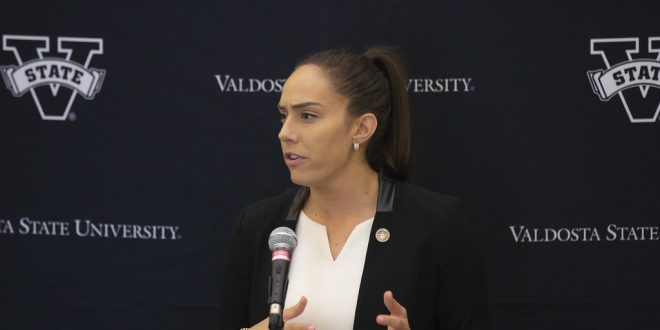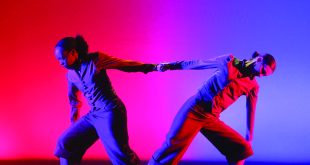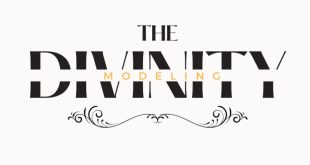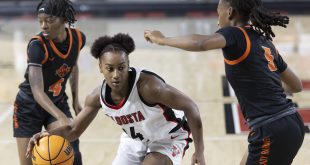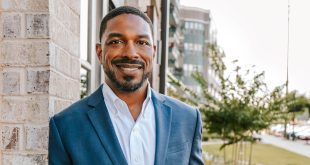Lady Blazers head coach Deandra Schirmer is entering her first season at the helm of the Lady Blazers.
Here are a few questions from Kyle Grondin, staff writer, as he interviewed Schirmer:
When did you start playing basketball?
“I was always very energetic child, playing every sport. You know and my family was a football family and then a lot of the females played volleyball. For me, I always liked basketball because it was much more of an intellectual game that I could play in different roles and know the strategy. I just kind of drifted towards that and I’ve been playing since I was little but really didn’t even get into basketball as my only sport until college.”
There’s an ongoing debate about whether kids at a young age should specialize in one sport or play a variety of sports. Given your background do you feel that playing a variety has merits?
“I think you learn valuable skills with different sports. You know volleyball is a great learning tool for rebounding. To read the ball in the air and react to the ball. It can directly translate to rebounding. Playing different sports allows you to develop different skill sets helps you train. Actually training different muscles that you want to always use on the basketball court so it is definitely a way of cross training.”
What brought you to Valdosta State?
“I had been at Eckerd for a while and for me it was a great situation. I had a great boss and it was a great system and great culture. I wasn’t going to leave for just any job and was looking for the right fit.
I was familiar with VSU because we had come to play here before and I had a familiarity with the facilities and staff here which helped. Then, of course, it’s Titletown. Blazer Nation is such a respected thing and I am very fortunate to be a part of.
When Eckerd came to VSU, what stood out to you?
“I remember specifically our players will not pay attention during the game because they had cartoons going on with the TV and had sparks flying during pregame. It was non-conference, women’s basketball game that had a great crowd and a great following. I thought, ‘Wow, they have such a great community here and it’s great to build a program.”
So let’s go back to your playing days. You had a solid career at USC Aiken, what were the biggest highlights of your career?
“Personally, I will always be the first to tell you I was not a stud during my playing career. I don’t think I led my team in any statistical category, maybe rebounding. But I always prided myself on being a good teammate, I prided myself in being really coachable and being able to accept my role and help my team win. Everywhere I went I saw success, and that had to do with accepting my role and being the best teammate.”
As someone who played as an aggressive rebounder, do you try and instill that level of physicality into your team?
“Yeah I think teams always are going to take on the identity of their coach. So, for me a big piece is rebounding and defense are hustle plays. For me, I always want to make sure my team is outworking the other team. We did a toughness drill the other day to take charges and dive on loose balls. That is something I try to instill in how ‘This is how a team wins’ games.’
You mentioned playing your role, and I think roles are particularly important in basketball. How do you, as a coach, go about carving out the roles for your players?
“I think the biggest thing with roles and having people understand what people bring to a team is being as transparent as possible. Honesty is really appreciated and players want that honesty. I’m still learning a lot of their capabilities and being honest during player meetings with how to define their role and work on developing their skills.
Is being a former player help build that level of trust and relationship with the player where you can be honest?
“Yeah of course. I understand to treat players as I wanted to be treated. I can relate to what they’re going through and we work hard as a staff to make sure we understand those feelings.”
When did you decide coaching was what you wanted to do?
“I actually started going into graphic design and I had a job in graphic design when I was graduating. Then I went to get my Master’s degree in Atlanta at Georgia State and was in a marketing program, knowing I wanted to hang up the shoes. Then for my marketing program, I remember working some of the football and basketball games and realizing I just really missed the interaction with the players I really miss the camaraderie of it and I miss being in a social setting right here on a team and you’re pushing each other for your best. Sports is like going to war every single night with your teammates. For me I really missed that and I missed having that interaction. I might be crazy because coaching is a taxing job, but I wouldn’t trade it for anything in the world.”
That’s when you started as a graduate assistant coach at Georgia State. What’d you learn from the Division 1 game?
“To know who you can trust. The biggest thing I took away from Georgia State is to surround yourself with good people. I think that you can have the most beautiful facilities you can be in the city but it is pointless without people you trust on your staff. I’ve coached in Atlanta, on the coast, and all those bells and whistles are nice, but if you don’t have good people around you if your day in and day out if you’re not surrounding yourself with good quality character people that have the same morals that align with you then your job is going to really suck and it’s not going to be enjoyable. I’ve worked really hard to have a staff I can trust and that I am so proud of.
What is the most important lesson you try to coach?
I think by nature, people all me in an intense person and I think that intensity and that passion is something I try to pass on to my players. If people, see you have that clear vision I think people really gravitate towards that and I remember when I first got to Eckerd and it was kind of the players were a little taken aback at first. But that passion to the game and contributing that way was always my first lesson. When I got to Eckerd and learned under coach Paul Honsinger, who I think is one of the brightest minds at the Division II level, I started to develop my own deeper understanding of the X’s and O’s, but always having that passion and building that culture was my first step.
How are you hoping to bring that culture to VSU?
“I think the program was in great shape when I took over but it starts with recruiting. I always want to look at the character of the person I’m bringing onto campus. If you don’t have the right people that are bought into what you’re trying to accomplish than it will be a tough job. We just got two commits for the 2020 class I couldn’t be happier with their mentality and their character. They both come from winning programs and have a great background that I’m looking for.
Recruiting is such a limited timeframe, and it is seemingly always shrinking. How are you able to judge their character in those brief interactions?
“I think it is just doing your homework. Calling references, coaches and how they’re interacting with their team. It isn’t just as much about how their jump shot looks, but when they’re on the bench, how is a player interacting with their team and are they leading the huddle or just sitting by and not caring.”
You mentioned coach Honsinger, what did you learn from him?
“I learned everything from him. I could make this entire interview about coach Honsinger. He is the best type of person and we need more coaches like him, leaving players in better situations than when they started.”
The team at Eckerd ran the Princeton offense, is the plan to put that in at VSU?
“We’ve been putting it into the game plan. It’s something that I was nervous about putting in at first but the players are buying in. I brought in two transfers from my conference and they’ve seen it be successful. The team as a whole has done a great job of taking it on as a challenge and going at a 100 miles per hour with me to learn this system.
One of the biggest things with the Princeton, and you may disagree with me, is the constant movement and motion to create easy baskets. So chemistry has to be perfect, everything is precise and the players have to know when to cut and when to pass. Is that chemistry what you’ve been pushing the most?
“You’re right, and we’ve preached this offseason that we are playing as five. Offensively and defensively, all five players work together and communicate with one another. It takes a lot of buy in from the players and unselfish play. I’ve been so pleasantly surprised with the players and how they’ve bought in. But were still in the honeymoon stage, and I know there will be times this season where we’re frustrated, but so far, so good and we’ll need to continue to trust one another.
How is that chemistry built?
“Just constant reps in practice. One reason players love the offense because the ball is shared. No plays are designed for any one player so players enjoy the freedom from control and freedom from intricate movement, which I think they will enjoy playing offense this season.”
They struggled to score the ball last season, how will this offense develop in this system?
“One of the things we’re working on is finding high quality scoring opportunities. VSU last season was one of the best defensive teams in the country, and obviously we don’t want to change that. But to win national championships, the best teams can win in a variety of different ways. So good scoring opportunities in a game where another team is shooting the lights out is imperative and being good at many different things.”
How important is that level of flexibility to a basketball team?
“It’s imperative. The very best teams find ways to win when plan A or maybe even plan B isn’t working. So being good at a lot of different things is important to winning championships and building a great program.”
What do you consider a success in season one?
“Well, we were predicted to finish fifth in the conference, where they finish last season, and the players were very upset with those rankings. They want to finish in the top three and compete in the tournament but I just want them to play to their highest potential. I know at our best we can play at a top five level.
But my personality says I want to win. We have a lot of talent and with the amount of talent that has left the conference, I think the race will be wide open, so I want to go out and try and take it.”
Written by Kyle Grondin, Staff Writer. Photo courtesy of VSU Athletics.
For more sports click here.
 The Spectator The independent student newspaper of Valdosta State University
The Spectator The independent student newspaper of Valdosta State University



